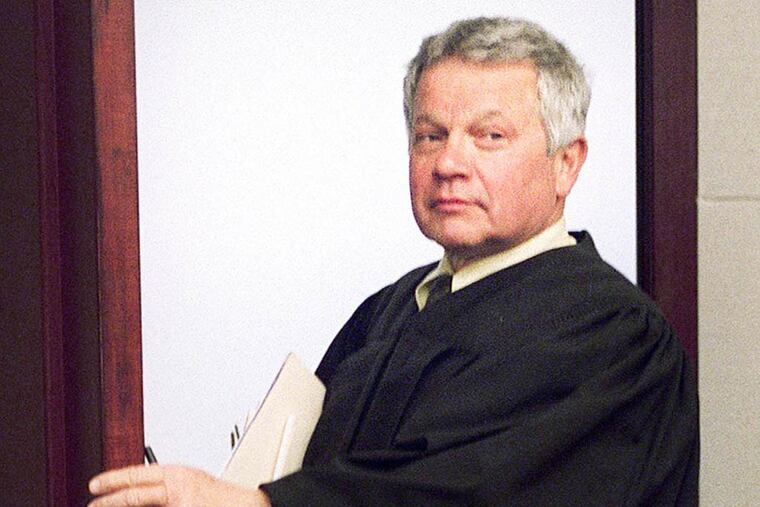Judge wins praise for standards, improvements
Common Pleas Judge Benjamin Lerner to receive Philly Bar Association's distinguished-jurist award.

COMMON PLEAS Judge Benjamin Lerner, with nearly 20 years on the bench, is respected by peers, prosecutors and defense lawyers.
Next week, Lerner, 73, will be recognized by the Philadelphia Bar Association. He will receive the Justice William J. Brennan Jr. Distinguished Jurist Award at the bar association's annual luncheon meeting Dec. 9 at the Hyatt at the Bellevue.
"Everybody who knows him knows him as a man of great integrity, vision and talent," said Bill Fedullo, chancellor of the bar association.
"I've known him as a friend and sometimes as a mentor to me," Fedullo added. "If you have a question with regard to ethics and evidence, he was the go-to person, especially in criminal law. You could feel confident in his answer."
The award recognizes a jurist who adheres to the highest ideals of judicial service. It was named in honor of the late U.S. Supreme Court justice who was its first recipient, in 1995.
From 1975 through 1990, Lerner served as chief defender of the Defender Association of Philadelphia. He was appointed a Common Pleas judge in 1996.
"I'm tremendously honored and flattered and grateful to receive this award," Lerner said last week. "For someone in any profession to be recognized for achievements by their peers, it seems to me to be the highest honor you can have."
Lerner is the Common Pleas Court's chief homicide calendar judge. He handles pre-trial matters, presides over guilty pleas and handles many sentencings, occasionally presiding over nonjury homicide trials.
He also considers "decertification cases" - deciding whether juveniles charged as adults for felonies should remain charged as adults or be transferred to Family Court, where they would be charged as juveniles.
Lerner has been instrumental in getting a substantial raise in fees for court-appointed lawyers who take on capital homicide cases. "He convinced me, as administrative judge, to raise the fees from $2,500 to $10,000 per case for capital cases, so we would have the best lawyers representing defendants in these criminal cases," Common Pleas Judge John Herron said last week.
Herron was the administrative judge of the trial division of Common Pleas Court from 1996 to 2002, and again starting in November 2011. His term as administrative judge ends today, when he is being succeeded by Kevin Dougherty, most recently administrative judge of Family Court.
The state Supreme Court in 2011 had appointed Lerner to review allegations that court-appointed lawyers on capital homicide cases were being paid so little that it violated their clients' constitutional rights. Lerner wrote two reports on the issue.
They showed that the court-appointed lawyers "were terribly underpaid and undercompensated," said Herron.
Herron also said that Lerner and Common Pleas Judge Jeffrey Minehart were instrumental in getting "more lawyers to take court appointments on homicide criminal cases," resulting in an "extraordinary turnaround" of homicide cases.
Minehart, supervising judge of the Common Pleas criminal-trial division, said Friday that Lerner "really led the way" on this.
As a result, both this year and last year, the court has seen more homicide cases concluded than new cases coming in.
Lerner also credited the District Attorney's Office for being "much more careful" in deciding for which cases it would seek the death penalty as another factor in the quicker turnaround.
Herron nominated Lerner for the award, as did prominent defense lawyer Brian McMonagle, a former city prosecutor.
Lerner "has spent his entire life, both as a lawyer and as a jurist, protecting the Constitution even when protecting it was very difficult, and doing so under some extraordinary circumstances," McMonagle said. "To me, he has always acted with intellectual honesty and he's never suffered the arrogance of moral or intellectual supremacy."
Added McMonagle: "I've seen him weep for victims on the bench and I've seen him angry when he thought there was an injustice. I can't imagine anyone more deserving of this award than him."
Lerner has been serving as a senior judge for the last three years, having passed the state's mandatory retirement age of 70. Judges may continue to serve after the year in which they turn 70 if the state Supreme Court allows it. Lerner still does the same work, but now gets paid less.
"He has more mental acuity at this age . . . than a lot of people," said Herron.